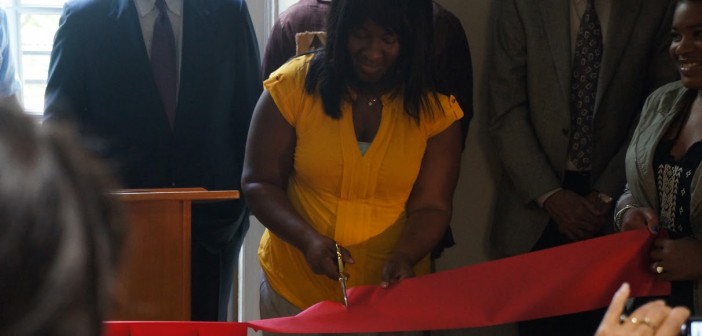Lehigh celebrated the unveiling of a renovated Umoja House this week — a project encompassing not only physical renovations but systematic changes as well.
A ribbon-cutting ceremony was held at the Umoja House on Tuesday to unveil the changes made to the residence hall during the summer.
According to Angela Scott, director for Academic Diversity and Outreach and a leader of the Umoja House project, many of the changes were inspired by the desire for the residence hall to become a more welcoming environment for all members of the Lehigh community.
“For many years, there has been discussion amongst the Lehigh community about enhancing the living and learning experience for the students here at the residence hall,” Scott told The Brown and White. “It was not until December of last year that it was determined that I should bring together a group of faculty, staff and students and come up with ways to actually put what has been discussed into action.”
One of the major renovations made to the house was the addition of a classroom on the first floor. Scott said this classroom has seating capacity for up to 45 people and can be reserved by anyone in the Lehigh or local community. In creating this available space, Scott hopes that a more inclusive environment will develop.
“Student groups, faculty members and members of the local community will hopefully enter into the halls of this residence hall and have the opportunity to spend time here and interact with the students,” Scott said.
Another new space is a dance studio in the basement of the residence hall. One student organization that has already begun to use this space is LU’s Finest Step Team. In addition to the dance studio, a common space for the residents of Umoja House and their guests has been added to the basement.
James Peterson, director of Lehigh’s Africana Studies program and an associate professor of English, will also now utilize a new office space in the house to hold office hours and other events. Carmen Phillips, a post-doctoral Fellow in Africana Studies, will share the space.
“We had initially hoped that a faculty member would be able to reside here and truly share in the living experience of the current residents here at the Umoja House,” Scott said. “After several discussions, we decided that it would be best if a faculty member spent several hours of his or her week here and have one-on-one interactions with the students, developed professional relationships with the students and held office hours as well.”
In addition to the Umoja House’s physical alterations, the dining options for its residents have been expanded. This year, with the support of David Joseph, executive director of Student Auxiliary Services, the student residents have been given a customized meal plan that includes a personal Lehigh Dining Services chef who will cook on Saturday and Sunday evenings. The students have also been provided with a pantry stocked with smaller snack items and are allowed to invite guests to the house for meals.
Overall, Scott said she is passionate about the inclusivity that these renovations promote.
“The commitment of the university to this initiative and project shows the support of a more inclusive and diverse environment,” Scott said. “Many people who ordinarily would not have come into the Umoja house will now have the opportunity to do so. They will be attending classes here, they will be attending events here and they may be sharing meals here.”
Interim President Kevin Clayton also discussed the significance of these renovations during his speech at the ribbon-cutting ceremony.
“In re-dedicating this space, we celebrate learning in all of its many and varied forms,” Clayton said. “We celebrate the diversity that enriches this campus, and we celebrate the accomplished, creative and successful students who live and learn here every day.”
For some of the students who reside in the Umoja House, increased interaction with non-residents is one of the major changes they hope will come out of the renovations.
“I’ve felt in the past that there’s a ‘mystique’ about the house, and this year is really an opportunity for the mystique to really be broken,” said Paul Lyons, ’16, a third-time resident of Umoja House and president of the House Council. “This year is an opportunity for people to come up and check the house out and to really get to know the residents, as well.”
Sydney Bagley, ‘16, a student living in the house for a second year and Umoja’s events coordinator, expressed similar hopes.
“The Umoja House was kind of known as this myth, this place that people couldn’t go to,” Bagley said. “I think opening up — like how we have a classroom and access to the house so you can get in — I think that it makes it seem more inclusive.”
The Umoja House, however, symbolizes more than just a living space. “Umoja” is the Swahili word for “unity,” and according to Scott, the house embodies its name.
“The students have shared with me many times that they love their community, and the sense of family that dwells within this residence hall,” Scott said. “They are able to comfort each other during times of stress, they are able to have great memories right within this house.
“So, to me, the Umoja house represents diversity, it represents inclusivity and it represents community and family. And importantly, it represents a commitment that Lehigh has made to its students.”
The Umoja House renovations are only the beginning of many forthcoming efforts of diversity and inclusion for Lehigh.
“What I would like to see is for Lehigh to keep moving forward,” Lyons said. “Keep moving forward with what they’re doing, keep with the current goals they have in mind when they are doing new projects, hiring new staff, recruiting new students and creating new classes. Just always keep diversity and inclusion (at) the forefront of what they’re doing, because that’s really the only way to make the institution a more welcoming place.”
Leon Caldwell,’91, G’93, a founding member of the Umoja House, also described his hopes for the future in regards to the initial vision he had for the house.
“Despite what happens, you’ll have a Dean Smeaton and you’ll have a Henry Odi… faculty and staff who want to protect the students but make sure that the campus is truly welcoming and inclusive to all students, not just the privileged class,” Caldwell said.
Caldwell said that he hopes that students appreciate and recognize that the struggles they’ve encountered over the past few years are the struggles previous generations of Lehigh students have endured, as well.
“Each generation of students has its trials and I think out of it, you build your leadership, find your voice, and you fight and stand up for a change,” Caldwell said.
The renovations at the Umoja House are just the beginning for Lehigh’s efforts to promote diversity and inclusion. During his speech, Clayton attributed the most recent improvements to the hard work and dedication of many people, particularly faculty, staff, students and alumni.
“We can proudly stand here today and say that the U-house is back, better and stronger than ever,” he said. “Make no mistake about it, a strong and vibrant Umoja House makes Lehigh a stronger university.”






Comment policy
Comments posted to The Brown and White website are reviewed by a moderator before being approved. Incendiary speech or harassing language, including comments targeted at individuals, may be deemed unacceptable and not published. Spam and other soliciting will also be declined.
The Brown and White also reserves the right to not publish entirely anonymous comments.